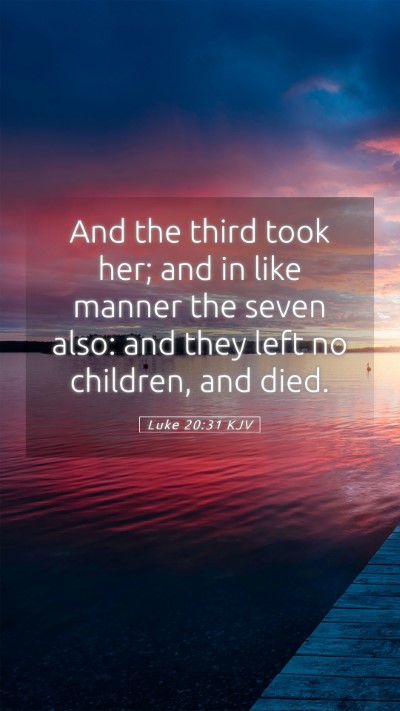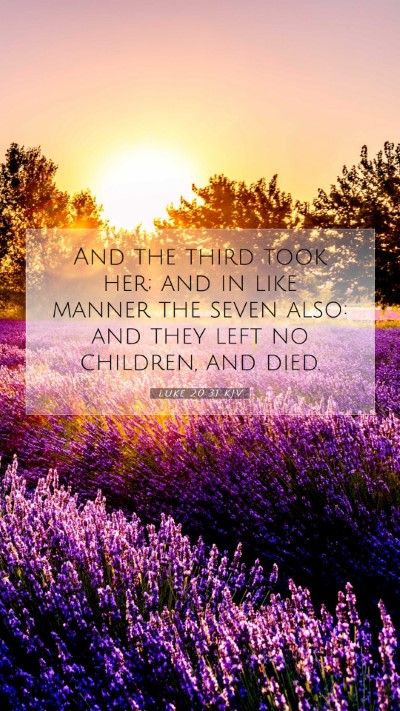Bible Verse Meaning: Luke 20:31
Bible Verse: Luke 20:31 - "And the third took her; and in like manner the seven also: and they left no children, and died."
This verse is part of a dialogue where the Sadducees, who do not believe in the resurrection, present a hypothetical situation to challenge Jesus. They recount a leverite marriage situation, which was a Jewish law where a man was obliged to marry his brother's widow if he died childless.
Summary of Commentary Insights
The insights from well-known public domain commentaries provide a deeper understanding of this verse.
Matthew Henry's Commentary
Henry explains that the Sadducees were trying to ridicule the doctrine of resurrection by presenting an absurd yet intricate case. They hoped to undermine Jesus' teaching by illustrating the complexities of the resurrection. They used the law to construct their argument; however, they misinterpreted the intent behind the scripture. He emphasizes that the resurrection involves a transformation wherein earthly relationships will not apply in the same manner.
Albert Barnes' Commentary
Barnes highlights that the Sadducees are illustrating their skepticism towards the resurrection by listing the extreme case of multiple marriages following the levirate law without any offspring. Their perspective reflects a misunderstanding of the nature of eternal life. Barnes points out the importance of understanding the resurrection not as a continuation of earthly life but as a new existence altogether. The Sadducees' argument is shown to be flawed as it does not grasp the full picture of divine order and resurrection.
Adam Clarke's Commentary
Clarke delves into the cultural background of this practice, identifying it as a means to ensure family lines carry on. He acknowledges the clever construct presented by the Sadducees but insists that it falls short of revealing the truth about God's power and the forthcoming resurrection. Clarke emphasizes the necessity of faith to comprehend the realities beyond human understanding and the limitations of earthly logic when applied to divine truths.
Key Themes and Meanings
- Misinterpretation of Scripture: The Sadducees' approach reveals how one can misuse scripture for argumentation instead of enlightenment.
- The Nature of Resurrection: This verse pushes the reader to contemplate the resurrection not merely as life after death but as a transformational state that transcends earthly relationships.
- Divine Order: It indicates God’s authority over life, death, and the afterlife, challenging the listener to trust in God's plan beyond human comprehension.
- Historical Context: Understanding this verse requires a grasp of Jewish customs, particularly concerning marriage and lineage, and the societal implications of failing to adhere to them.
Application of Insights
For modern believers, Luke 20:31 encourages deeper Bible verse understanding and serves as a reminder of the transformative power of faith. It is essential not only to seek Bible study resources but also to engage in online Bible study that fosters a thorough analysis and practical application of Scripture in daily life.
Cross References
- Matthew 22:29-30 - Jesus responds to the Sadducees' challenge regarding resurrection.
- Mark 12:24-25 - Similar account of Jesus addressing the Sadducees' misunderstanding.
- 1 Corinthians 15:12-22 - Paul discusses the resurrection and its implications for believers.
Final Thoughts
This verse and its commentaries invite readers to think critically about the teachings of Jesus and the meaning of resurrection. By studying such passages, believers can learn how to interpret Bible verses effectively, ultimately enriching their Bible study insights and enhancing their personal faith journeys.


